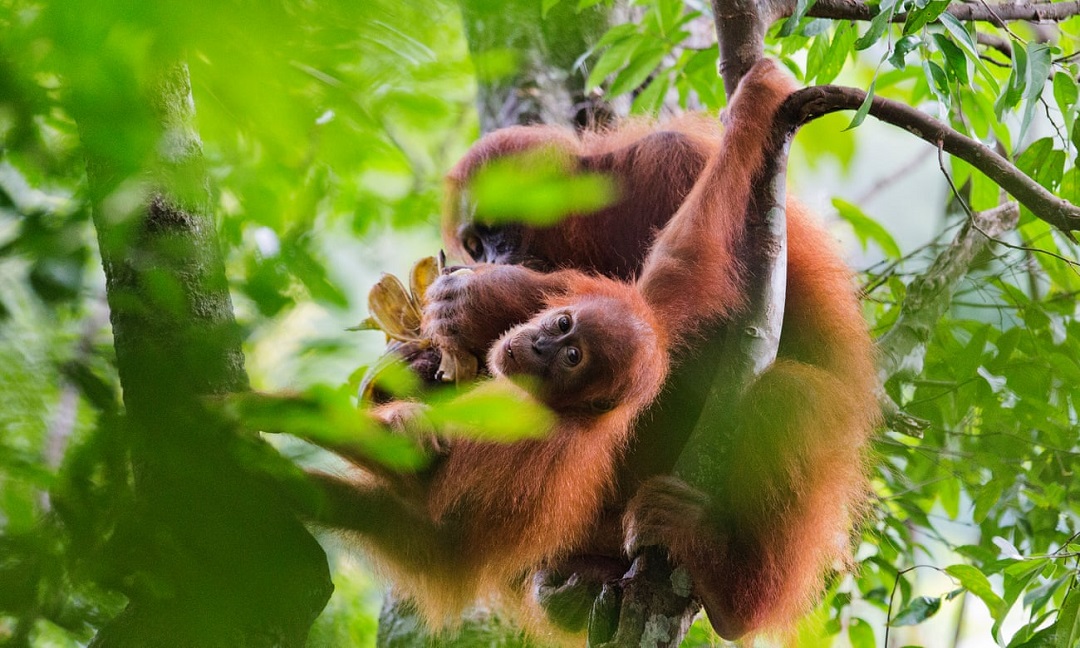Orangutans – they are just like us. Or 97 percent like us, to be precise. Humans and orangutans share 97 percent of their DNA sequence. In fact the name orangutan comes from the Malay words ‘orang hutan’ meaning ‘human of the forest.’
Males of the species are known to find human women attractive, with many trying to woo the female primatologists who study them in the wild. They are one of the few animals self-aware enough to pass the mirror test, that is they recognise that the reflection in the mirror is an image of themselves. Even humans can’t do that until 18 months to 2 years of age.
Orangutans are loving mothers. They give birth once in 8 years and keep their babies with them until they are 6 or 7 years old and have learnt all the skills necessary for survival. They don’t make great dads though. The males like to be left alone, probably so they are free to do all that wooing.

These super smart creatures can use tools like twigs to fork out insects or leaves to amplify their voices. They are loveable and friendly creatures who spend most of their time hanging out on trees. Sadly, their numbers are dwindling. They are now considered endangered and it’s all happening because of one ingredient that is common to a majority of household products.
Orangutans are native to Sumatra and Borneo in southeast Asia. About 50 percent of packaged goods on our supermarket shelves – innocuous household items we might not give a second thought to – contain palm oil. Be it a common laundry detergent, that delicious hazelnut spread, shampoos, shower gels, cooking oils and many many more are on the culprit list. 90 percent of that palm oil comes from plantations which were created after destroying the rainforests of Indonesia and Malaysia.
“It felt like a disaster for the planet, what I was witnessing. You see these forests just being bulldozed down and you see orangutans being extracted from small patches of forests and it’s heart breaking,” shared photographer Paul Hilton of his experiences of observing orangutan decimation from ground zero. Hilton based himself in one of the most biodiverse hotspots in the world – the Leuser ecosystem in Aceh – from where he has been dispatching reports and images of the man-made crisis unfolding there.
The Leuser ecosystem, a forest area located in Aceh and Sumatra, is the last place in the world where rhinos, orangutans, tigers and elephants co-exist. It’s home to more than 200 mammal and 500 bird species, many of which are not found anywhere else in the world. Large parts of the forest have been razed to make way for palm oil plantations and the remaining areas are under severe threat.
The orangutans who have survived the culling have an even worse fate waiting for them. Due to deforestation and depleting food sources they are forced to encroach on human agriculture for sustenance. Enraged farmers shoot them for being pests. There are numerous reports of villagers trapping and torturing them for fun. They’ve become easy targets for poachers to capture and sell on the black market. The ones who manage to survive in the wild have to resort to unthinkable ways to do so.
Jayaprakash Joghee Bojan was awarded National Geographic’s Nature Photographer of the Year in 2017 for capturing an unique image. Orangutans are arboreal animals who spend 95 percent of their time on trees and hate the water. Bojan chanced upon an orangutan wading through crocodile infested waters in order to get to areas where it hoped to find food. At one point the orangutan returned the camera’s gaze, sending a silent message to its human audience.
What can we – who are sitting at home thousands of miles away from Indonesian rainforests – do to help the humans of the forest? The simplest and most effective way is to boycott palm oil products. Studies have shown that many multinationals and corporate chains are hands in gloves with local businessmen who are mowing down the rainforests like knife through butter. Boycotting their products is the surest way to send the message that prioritizing profit over planet will not benefit them in any way.
Those of us who are privileged enough to vote with our wallets could do so. We live in an era when internet searches and information equip us with all the knowledge we’ll ever need. Choosing local artisan soap makers instead of the products of giant conglomerates, cleaning our homes with a safe cocktail of vinegar and baking soda instead of toxic chemicals and whipping up delicious homemade treats instead of packaged junk food whose main ingredients are ammonium sulphate and palm oil – these are easy ways to get started.
It’s more effort than swiping products off the supermarket aisle. We are not here to preach and only wish for you to what you want to do and what is within your bandwidth. For busy mothers with young children or stressed executives working 14 hours a day this might seem like an impossible demand. At the end of the day you have to prioritise what you value most. And if that includes saving the homes of these adorable orange primates, then we wish you all the best with your efforts. An added incentive – what’s good for the planet is by default good for ourselves. Less palm oil in the environment means a healthier habitat for earth and healthier bodies for ourselves.